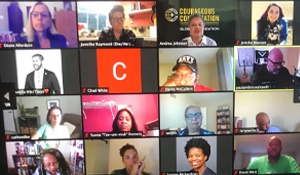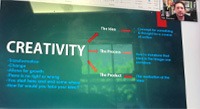Summer 2020 Virtual Ph.D. Residency inspires change
What does it mean to be Black and patriotic in 21st-century America? Can life-enhancing outcomes positively affect the mentally ill? These are just two of the topics Ph.D. students grappled with at the Summer 2020 Virtual Ph.D. Residency July 2-10, with 90 students and 22 faculty members participating, assisted by administrators and staff across the university.
The bi-annual Ph.D. residency, until now, has been held face-to-face, bringing together doctoral students and faculty to connect, take classes and seminars, meet with faculty, and create community. The coronavirus pandemic impacted this tradition when administrators made the difficult decision to hold the residency as a virtual experience, mirroring the mid-residencies held throughout the year.
Fellow students and faculty welcomed Cohort 24, a diverse group ranging in age from 26 to 82, from six states as well as Lagos and the Ukraine.

While the new and returning students and faculty missed the deep personal interactions of the in-person residencies, the experience was considered a success. “The exploration of ideas in a vibrant community of academically focused peers and mentors is the hallmark of residency. The experience, even a virtual experience, bonds the students and inspires each to make a change,” said President Dr. Karen Schuster Webb. “They find respect for differences and diversity, and encouragement to visualize and conceptualize ideas for change in their communities.”
Jennifer Raymond, Ph.D., interim dean of the Ph.D. Program in Interdisciplinary Studies program reflected on the decision to hold a virtual residency.
“When we learned that we would not be able to hold our residency in person, I heard from faculty and students that they appreciated the concern for their safety,” Dr. Raymond said. “Still, there was a sense of loss and grief about not being together in person. We decided to build the July 2020 Ph.D. virtual residency around the themes of creativity. The residency planning committee and the student governance committee worked together to create a vibrant and engaging residency. We created a pre-residency speaker series during the months of May and June, which featured faculty, alumni and guest speakers. Next, we considered how to accommodate students across six or more time zones. To ensure close connectivity and mentoring, faculty made themselves available for individual and small group meetings. Several faculty held “Coffee Hours” for students and faculty to just drop by and visit. And, we even offered virtual chair yoga classes.”
Academic classes and activities throughout the eight-day residency incorporated topics ranging from the creative process to research methods, including “The Call to Lead” by Dr. Betty Overton-Adkins, “Memoir & Identity” by Dr. Diane Allerdyce, “Education for Democracy & Social Justice” by Dr. Hassana Alidou, and “Design Thinking” by Dr. Anu Mitra.

Guest speakers included alumnus Raul Manzano, Ph.D., 2015, who uses art as a powerful force for challenging dominant narratives and advocating for social change. His topic addressed the post- Ph.D. journey and creativity.

Guest speaker Julie Marie Wade presented on “The Personal is Still Political: Making Art with Pride in the New Millennium.” Wade is the author of 12 collections of poetry and prose, including “P*R*I*D*E” and the book-length lyric essay, “Just an Ordinary Woman Breathing.”
New students were also introduced to Penumbra, Union’s interdisciplinary journal of critical and creative inquiry. Penumbra is a peer-edited, peer-reviewed, online journal, created in 2013 by faculty and students under the leadership of Dr. Karsten Piep. Penumbra invites academic papers as well as creative and critical works that address any aspect of the journal’s mission and scope. Penumbra’s goal is to promote social change through theoretically informed engagements with concrete issues and problems by publishing socially engaged innovative, creative, and critical scholarship, with a focus on ethical, political, and aesthetic issues in the humanities, public policy, and leadership.
Dr. Raymond sums up the July 2020 virtual residency experience this way.
“We discussed philosophy, and enjoyed music and dance performances. We made art collaboratively and wrote poetry together. We shared photos of our gardens, our pets and our families. We pledged always to be the Culture Keepers of this Ph.D. program. Our Student Governance Committee offered mentoring and guidance on how to thrive in a Ph.D. program. Our MLK scholars dazzled us with their research. When we signed off for the last meeting, there was smiling and cheering and applause, and messages of best wishes and appreciation to all. Our program continues to grow and thrive because we are creative and committed to social change and to each other. Whether we sit in the same physical space or zoom room, we are a community, and we are Union.”
Union’s next Ph.D. residency is scheduled for early January 2021, when it will welcome Cohort 25.
The Union Institute & University doctoral program incorporates interdisciplinary study that explores ideas and practices in leadership, public policy, social change, ethics, creativity, innovation, design thinking, and beyond. Concentrations include Educational Studies, Ethical & Creative Leadership, Humanities & Culture, Public Policy & Social Change. Union’s Graduate Certificates provide a distinguished addition to the Ph.D. focus. Each certificate includes 12 credits of courses integrated into the major in the areas of Creative Writing, Design Thinking, Educational Leadership, Executive Leadership, Martin Luther King, Jr. Studies & Social Change, and Women’s & Gender Studies.
Learn how the Union Ph.D. program will transform your life and community at this link.